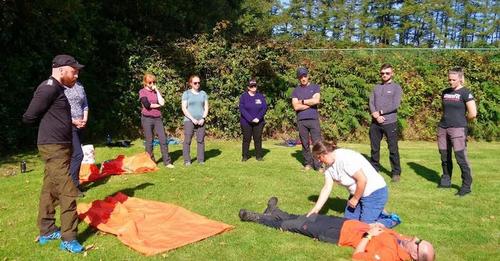Introduction
In a world where emergencies can strike at any moment, being equipped with the knowledge and skills to handle such situations is paramount. First aid training not only empowers individuals but also saves lives. In this comprehensive guide, we will delve into various aspects of first aid training in Ireland, answering the questions you might have and guiding you through the process.
Understanding the Importance of First Aid
What is First Aid and Why is it Important?
First aid refers to the immediate assistance given to individuals who are injured or suddenly taken ill before professional medical help arrives. Its importance lies in the fact that timely and appropriate first aid can prevent a minor injury from becoming a major one and can even save lives.
Who Should Learn First Aid?
First aid knowledge is invaluable for everyone, from parents and teachers to professionals and community members. Whether you're at home, work, or out in public, having first aid skills can make a significant difference in emergency situations.
The Role of Mental Health First Aid in Ireland
Mental health first aid is as crucial as physical first aid. Recognizing and providing support to those experiencing mental health issues is a skill that's gaining recognition in Ireland. Mental Health First Responder courses are specifically designed to address these needs, offering guidance and assistance in mental health crises.
Exploring First Aid Courses in Ireland
Types of First Aid Courses Available
1. First Aid Responder (FAR) Courses
FAR Courses provide in-depth training for individuals looking to become certified first aid responders. These courses cover a wide range of topics, including CPR, wound management, and emergency response strategies. The REC First Aid Course is specifically tailored for outdoor enthusiasts, teaching unique skills necessary for remote emergencies.
2. Basic First Aid Training
Basic Emergency First Aid Training equips participants with fundamental first aid skills. These courses are ideal for beginners and cover essential topics such as bandaging, CPR, and handling minor injuries. The 1 Day First Aid Course offers a condensed version for those with time constraints.
3. Basic Life Support (BLS) and CPR Training
BLS Course Dublin focuses on teaching participants how to perform high-quality CPR and use automated external defibrillators (AEDs). This training is vital for healthcare professionals and anyone interested in enhancing their CPR skills.
4. Manual Handling Courses
Manual handling courses, such as the Manual Handling Course, focus on safe lifting and handling techniques. These skills are particularly valuable in workplaces where physical tasks are common.
Choosing the Right First Aid Course
1. Factors to Consider
When selecting a first aid course, consider factors such as the depth of knowledge required, the duration of the course, and your specific needs. For instance, if you're an outdoor enthusiast, courses like REC First Aid might be more suitable due to their focus on remote emergencies.
2. Location and Accessibility
Finding a course near you is essential for convenience. Emergency First Aid offers various courses, including first aid courses near you, ensuring accessibility for individuals across Ireland.
Enrolling in a First Aid Course
How to Enroll
Enrolling in a first aid course is simple and accessible. Visit the Emergency First Aid website to explore the available courses. You can directly enroll in the desired course online, ensuring a hassle-free registration process.
Benefits of First Aid Training
1. Confidence in Emergencies
First aid training instills confidence in your ability to handle emergencies, making you a valuable asset in various situations.
2. Improved Safety in Communities
Individuals with first aid knowledge contribute to safer communities. Your skills could make a difference during accidents, injuries, or sudden illnesses in your neighborhood.
3. Professional Advancement
For professionals, having first aid certification enhances your resume and can be a requirement in various job roles, especially those involving caregiving or childcare.
Conclusion
In conclusion, first aid training is not just a skill; it's a life-saving tool that everyone should possess. Whether you're an outdoor enthusiast, a concerned parent, or a dedicated professional, enrolling in a first aid course is an investment in safety and preparedness. By choosing courses like FAR Courses, Basic First Aid, or REC First Aid, you're taking a significant step toward being a confident and capable first responder.
Remember, you never know when an emergency might occur, but with the right training, you'll be ready to respond effectively. So, don't wait—explore the courses offered by Emergency First Aid and embark on your journey to becoming a certified first aid provider.
Don't miss out on the opportunity to make a difference in your community and be the one who knows what to do when it matters the most. Sign up for a first aid course today and be prepared for whatever comes your way. Your skills could save a life.





